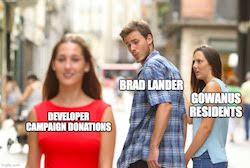Pardon me for asking, but will the fact that Barclays Bank has accumulated £1.3 billion in losses in the past 3 months alone have any impact on Bruce Ratner's Atlantic Yards Project?
The giant financial institution after all is willing to buy into Ratner's deal by paying the largest amount ever forked over in a stadium deal just for the pleasure of having the Brooklyn Nets home be named "Barclays Arena."
Now, the bank's losses seem pretty remarkable to me. Note that the sum is in British Pounds, not U.S. Dollars.
Could this derail Brucie's sweetheart deal? After all, how can the bank justify forking over all this money if they are bleeding? Or have they already signed everything and can't back out?
Can anyone better informed enlighten me on the subject?
Barclays, Britain's third-largest bank, today admitted it has taken a £1.3 billion hit in the past four months from the credit crisis that is wreaking havoc in world financial markets.
The writedown for October alone was £800 million. The bank was forced by speculation in the City to issue today's update on investment banking division Barclays Capital, which employs hundreds of people in Canary Wharf.
But the scale of the losses was far less than than £10 billion rumoured in the stock market late last week when trading in Barclays' shares was suspended briefly after the price plunged.
They rose 16p to 549p today as the bank said that even after the writedowns, BarCap's profits for the first 10 months of 2007 were, at £1.9 billion, ahead of the same period last year. BarCap had pre-tax profits of £2.21 billion in 2006, and the bank's total profits were £7.1 billion.
Barclays chief executive John Varley denied the bank had rushed out the BarCap statement ahead of a full trading update in two weeks' time.
"We have updated the market about BarCap each month from July to September, and decided we should do so again once we knew October's trading," he said.
BarCap head Bob Diamond said the £800 million October writedown had been so much larger than those of the preceding months because it contained what he called the "second leg-down in the subprime market". He explained: "Early in October, the credit ratings agencies downgraded some 5000 CDOs [collateralised debt obligations] and the next few weeks were by far the most severe in those markets.
"We have answered demands that we should give a greater degree of clarity on both our exposure and writedowns in these markets."
Diamond added that, despite the write-downs, BarCap had in October posted the fourth-highest monthly income in its history. He refused to say whether the writedowns would result in job cuts but pointed out that the majority of the losses were in the US.
"Prudent cost management is a stalwart of our ethos but we've nothing planned in that area at the moment," he added. As for bonuses, he was making no forecasts: "People are paid on performance, and the whole year is not through yet."
Diamond also said that Barclays' large leveraged-loan business had been far less badly hit by the credit crunch than many analysts had expected, with a net writedown of just £60 million.
That could prove good news for rival Royal Bank of Scotland, where analysts had been forecasting writedowns of at least £500 million, based mainly on its leveraged book and US consumer banking businesses. It is due to update the market on 6 December.
Diamond and Varley scotched rumours that one or both of them is set to leave the bank, which recently failed in its bid for ABN Amro to RBS. Asked if someone should step down Varley replied: "Actually what we've announced today is record profits at BarCap. I think that is a very resilient and very strong performance, with which I'm well-pleased."
Related Reading: Nothing Says "Brooklyn Basketball" Like... A British Banking Conglomerate (The Village Voice) For Home Page, click Pardon Me For Asking







.JPG)

1 comment:
Doubtful. Small writedown compared to major US Institutions, unless general cutback in spending.
AB
Post a Comment